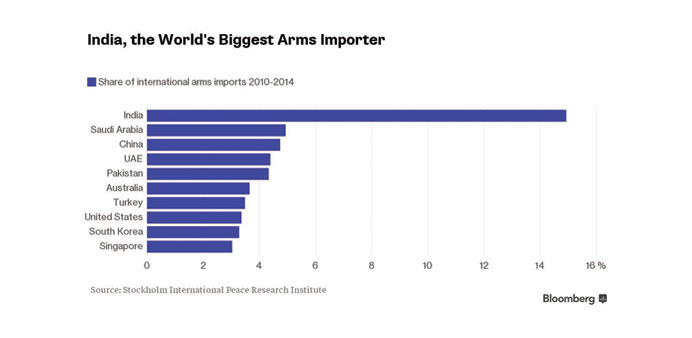Bloomberg
New Delhi
Germany’s Atlas Elektronik is tying up with one of billionaire Anil Ambani’s defence companies to make an advanced torpedo in India, as Prime Minister Narendra Modi pursues a $60bn expansion of the country’s navy.
The goal is a joint venture with Ambani’s Pipavav Defence & Offshore Engineering Co to make a heavyweight torpedo in India, according to Khalil Rahman, the chief executive of the German company’s local unit.
“Up until now, most of the projects to which we have sold were to supply equipment directly from Germany,” he said in an interview in New Delhi. “But it’s now clear some of the projects are coming out in the ‘buy and make in India’ category. What we need to do is to develop a supply chain, so that the sub-components are built in India.” Modi is seeking to almost double the size of India’s navy with locally made vessels to deter China in the Indian Ocean, spur manufacturing and encourage defence exports. His challenge is convincing global arms makers that India has the funds to match its ambitions and is making it easier to operate in Asia’s third-largest economy.
“Everyone starts with very good intentions,” Rahman said in the September 29 interview. “What happens in India generally – I’m not talking specifically about defence procurement procedures – things are very heavily regulated and we end up with complicated procedures to do anything. But things are beginning to change.” Daljeet Singh, a spokesman for Ambani’s Reliance Group, didn’t immediately comment on the tie-up with Atlas.
Pipavav Defence & Offshore Engineering closed 0.5% higher at Rs59.9 in Mumbai, bucking a 0.2% drop in S&P BSE Sensex index. Atlas, a ThyssenKrupp and Airbus Group company, says the SeaHake weapon – which is used by the German navy – can be fired from submarines and surface vessels. India is looking to add at least 100 warships by 2027, including 18 submarines.
“Anti-submarine warfare is the main preoccupation in the Indian Ocean at the moment,” Rahman said.
Atlas recently identified local businesses good enough to slot into the company’s global supply chain for the torpedoes, Rahman said.
It’s also tied up with Larsen & Toubro, India’s biggest engineering company, to bid for a contract to supply sonars that detect enemy divers when a ship is at anchor, he said.
Debojyoti Chatterjee, a spokesman for Larsen & Toubro, declined to comment.
Modi’s vision is to develop a defence-industrial complex that can improve India’s sometimes poorly equipped forces. His government has eased restrictions on foreign direct investment into the sector, and approved about $60bn of weapons’ purchases since taking office in May last year. A joint statement following a meeting between German Chancellor Angela Merkel and Modi in New Delhi earlier this month highlighted defence production as an area for increased business collaboration.
Even so, protracted procurement procedures and the need to find funds for the defence overhaul both pose risks for global manufacturers.
“The foreign companies that tie-up in India will have to look at not only supplying to armed forces here, but also look at exporting their products out of India, to beat that single-customer situation and make their businesses profitable,” said KV Kuber, an independent defence analyst based in New Delhi who previously helped India’s government form policies on arms acquisitions.

